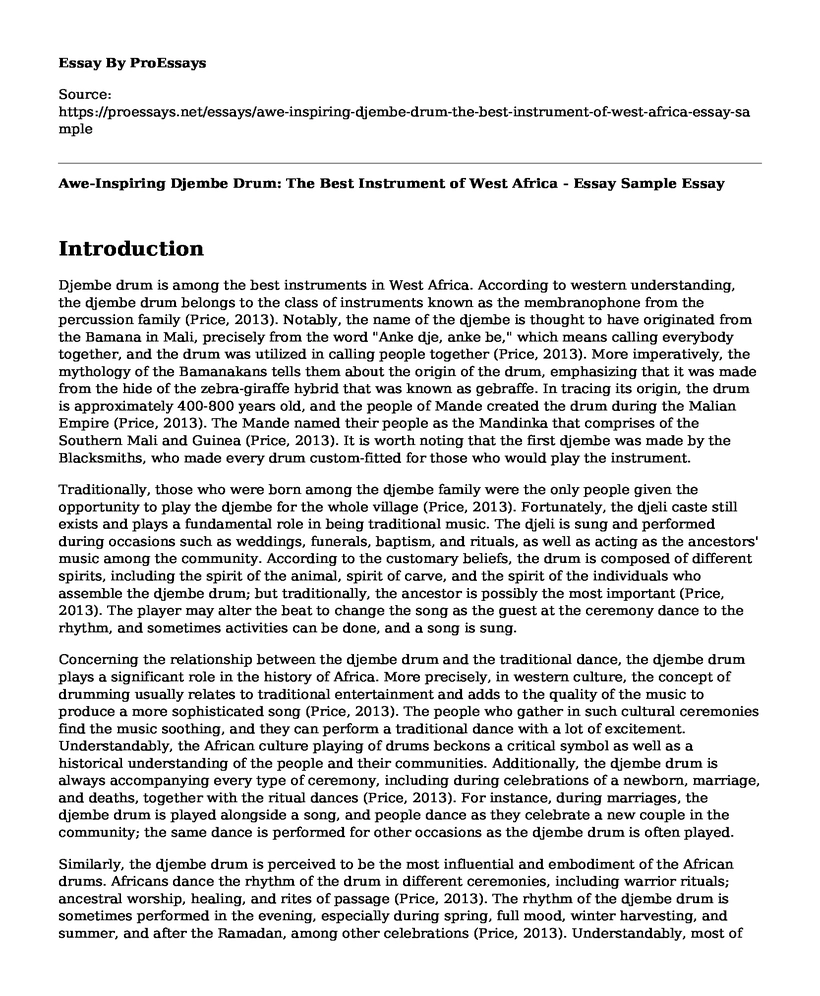Introduction
Djembe drum is among the best instruments in West Africa. According to western understanding, the djembe drum belongs to the class of instruments known as the membranophone from the percussion family (Price, 2013). Notably, the name of the djembe is thought to have originated from the Bamana in Mali, precisely from the word "Anke dje, anke be," which means calling everybody together, and the drum was utilized in calling people together (Price, 2013). More imperatively, the mythology of the Bamanakans tells them about the origin of the drum, emphasizing that it was made from the hide of the zebra-giraffe hybrid that was known as gebraffe. In tracing its origin, the drum is approximately 400-800 years old, and the people of Mande created the drum during the Malian Empire (Price, 2013). The Mande named their people as the Mandinka that comprises of the Southern Mali and Guinea (Price, 2013). It is worth noting that the first djembe was made by the Blacksmiths, who made every drum custom-fitted for those who would play the instrument.
Traditionally, those who were born among the djembe family were the only people given the opportunity to play the djembe for the whole village (Price, 2013). Fortunately, the djeli caste still exists and plays a fundamental role in being traditional music. The djeli is sung and performed during occasions such as weddings, funerals, baptism, and rituals, as well as acting as the ancestors' music among the community. According to the customary beliefs, the drum is composed of different spirits, including the spirit of the animal, spirit of carve, and the spirit of the individuals who assemble the djembe drum; but traditionally, the ancestor is possibly the most important (Price, 2013). The player may alter the beat to change the song as the guest at the ceremony dance to the rhythm, and sometimes activities can be done, and a song is sung.
Concerning the relationship between the djembe drum and the traditional dance, the djembe drum plays a significant role in the history of Africa. More precisely, in western culture, the concept of drumming usually relates to traditional entertainment and adds to the quality of the music to produce a more sophisticated song (Price, 2013). The people who gather in such cultural ceremonies find the music soothing, and they can perform a traditional dance with a lot of excitement. Understandably, the African culture playing of drums beckons a critical symbol as well as a historical understanding of the people and their communities. Additionally, the djembe drum is always accompanying every type of ceremony, including during celebrations of a newborn, marriage, and deaths, together with the ritual dances (Price, 2013). For instance, during marriages, the djembe drum is played alongside a song, and people dance as they celebrate a new couple in the community; the same dance is performed for other occasions as the djembe drum is often played.
Similarly, the djembe drum is perceived to be the most influential and embodiment of the African drums. Africans dance the rhythm of the drum in different ceremonies, including warrior rituals; ancestral worship, healing, and rites of passage (Price, 2013). The rhythm of the djembe drum is sometimes performed in the evening, especially during spring, full mood, winter harvesting, and summer, and after the Ramadan, among other celebrations (Price, 2013). Understandably, most of the drums are played in Africa to act as a symbol and to protect royalty as they are usually housed in the sacred dwellings. Such drums are also used in communication between tribes.
Reference
Price, T. Y. (2013). Rhythms of culture: Djembe and African memory in African-American cultural traditions. Black Music Research Journal, 33(2), 227-247. https://www.jstor.org/stable/10.5406/blacmusiresej.33.2.0227
Cite this page
Awe-Inspiring Djembe Drum: The Best Instrument of West Africa - Essay Sample. (2023, May 05). Retrieved from https://proessays.net/essays/awe-inspiring-djembe-drum-the-best-instrument-of-west-africa-essay-sample
If you are the original author of this essay and no longer wish to have it published on the ProEssays website, please click below to request its removal:
- Article Analysis Essay on Teachers, Social Media, and Free Speech
- Movie Analysis Essay on Ninotchka Film and From Russia With Love
- Essay Sample on Social Media Platforms: Increasing Connectivity & User-Generated Content
- Film Analysis Essay on My Girl: An Uplifting Summer Comedy-Drama From 1972
- Movie Analysis Essay on Beverly Hills Cop
- Essay Example on Funny Face: A Musical Comedy of Love and Joy
- Paper Example on The Black Power Mixtape: A Movement's Journey 1967-1975







